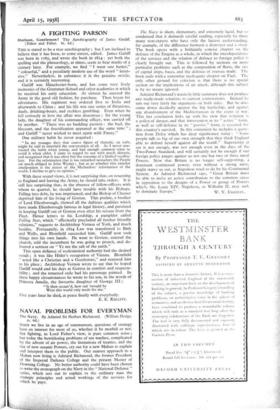A- FIGHTING PARSON
Stations, Gentlemen ! The Autobiography of James Gatliff. ( Faber and Faber. 8s. 6d.) Stations, Gentlemen ! The Autobiography of James Gatliff. ( Faber and Faber. 8s. 6d.) Tins is stated to be a true autobiography ; but I am inclined to believe that it has been, to some extent, edited. James Gatliff was born in 1765, and wrote the book in 1824: yet both the spelling and the phraseology, at times, seem to bear marks of a century later. For example, we find " I went one better," " colourful," and a peculiarly modern use of the word " inten- sive." Nevertheles's, in substance it is the genuine article, and it is certainly, interesting.
Gatliff was Manchester-born, and has some very lively memories of the Grammar-School and other academies at which he received his early education. At sixteen he entered the Army in the good old fashion, by purchase. Then began his adventures. His regiment was ordered first to India and afterwards to China ; and his life was one series of flirtations, duels, drinking-bouts, and reckless gambling. Even when he fell seriously in love the affair was disastrous ; for the young lady, the daughter of his commanding officer, was carried off by another. " There was no budding passion : the bud, the blossom, and the fructification appeared at the same time " ; and Gatliff " never wished to meet again with Fanny." One military habit he never acquired : " In my younger days that coarse figure of rhetoric, an oath, might be said to interlard the conversation of all. As I never con- tracted the habit when young, and had enough common sense to avoid it when older, I came to regard its use with much distaste, and recognised that it was often but the outcome of a limited vocabu- lary. For the reformation that is too remarked nowadays the People are much obliged to John Wesley ; but as to whether this exterior amelioration is the extent of the Methodists' reformation of the world, I decline to give an opinion."
With these sound views, it is not surprising that, on returning to England and leaving the Army, he should take orders. It is still less surprising that, in the absence of fellow-officers with whom to quarrel, he should have trouble with his Bishops. Falling into debt, he was imprisoned, and the Bishop of Chester deprived him of his living of Gorton. This prelate, a brother of Lord Ellenborough, showed all the dubious qualities which have made Ellenborough famous in legal history, and persisted in keeping Gatliff out of Gorton even after his release from the Fleet. Hence letters to his Lordship, a pamphlet called Falling Star, which " effectually precluded all further friendly relations," requests to Archbishop Vernon of York, and much besides. Fortunately, in 1824 Law was transferred to Bath and Wells, and Blomfield succeeded him. Gatliff now took things into his own hands. He went to Gorton, entered the church, told the incumbent he was going to preach, and de- livered a sermon on " Ye are the salt of the earth."
This open defiance of ecclesiastical authority had the desired result ; it was like Hitler's occupation of Vienna. Blomfield " acted like a Christian and a Gentleman," and restored him to his place ; Archbishop Vernon wrote to say that he hoped Gatliff would end his days at Gorton in comfort anti respecta- bility ; and the returned exile had his parsonage painted. In these happy circumstances he wrote to his son, in the words of Princess Amelia, the favourite daughter of George III :
"It then occurr'd, how sad '[would be Were this world only made for me."
Five years later he died, at peace finally with everybody.
E. E. KELLETT.






































 Previous page
Previous page